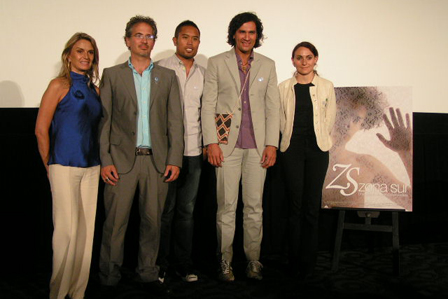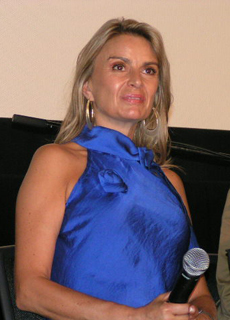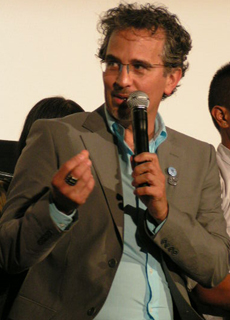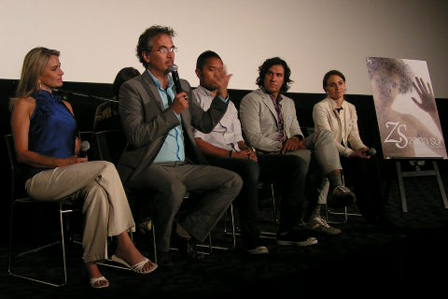2009.10.20
[Event Reports]
Competition section, Southern District: Oct. 18th, Q & A Report
For Japanese people, Bolivian films are still unfamiliar. The film, Southern District depicts the contradicting relationship between the wealthy family and faithful servants that exists in today’s Bolivia with the unconventional cinematography techniques.
The Director of the film, Juan Carlos Valdivia and a leading actress, Ninón del Castilio; Director of Photography, Paul de Lumen and the production designer, Joaquín Sánchez and the Producer, Gabriela Maire, all appeared for Q&A session after the screening.

Appearing on the photo from the left, Ms. Ninón del Castilio, Director Juan Carlos Valdivia, Paul de Lumen, Joaquín Sánchez and Gabriela Maire.
The Director, Juan Carlos Valdivia, gives a greeting first. “Thank you for visiting us. This is the first time for us to participate in the film festival like this one. I have a great interest in how people in Japan, who live in the other side of the earth, respond to our film. We are very pleased to be able to be here today.
※ The following Q & A contains elements that refer to the story and the ending of the film.
Q In this film, the house itself seems to be the central character of the film. How did you discover that wonderful mise en scene, the house in your film?
Juan Carlos Valdivia: You are right. The house has a role as a character in this film. It was the Production Director, Joaquín who made the preparations. The every details in this house represents something.
Ninón del Castilio: I knew the people who lived in this house. I use go to the party in this house.

Q: This was the first Bolivian film entry for our film festival. I was attracted to the scenery, music, and the clothes that the native South American wore. I am not so familiar with the Bolivian society but I would like to know if there are racial and class discriminations?
Juan Carlos Valdivia: Bolivia is a country with diverse cultures. As you have seen in the movie, people actually speak the indigenous language of the South American natives. But nowadays, the indigenous people are starting to gain power in our society and things are beginning to change. However, in this film, there are various cultures existing inside the house and that’s not about the discrimination between Caucasians or Negroes. There are various elements that co-exist here. In the film, there’s a little son who lives in the house. This small boy spends a long time with the native servants and learns the native culture from them. I believe that the house represents the current Bolivia like a cloth that weaves the culture.”

Q: In the end of the film, an intelligent mother finally sells the house. What inspired you to sell the house in the end of the film?
Juan Carlos Valdivia: Selling the house is very much like forfeiting everything you have. The lifestyle is revolving around the house. The house is a symbol of class in the society.
But the real situation that the family in the film is facing is that they no longer couldn’t pay the wages to the servants, and had no money to even purchase the bread. The situation has reversed and now they need to borrow the money from their servants because they have spent all their money by living so unrealistically. And in the end, the buyer of the house was an indigenous person who have risen to the new class and gained power and wealth.
Q: How do the people of the new class become wealthy?
Juan Carlos Valdivia: I can say that it’s a political change. There was an election held recently and the indigenous native person was chosen as the president. Until recently, people of our country have been leading a very old lifestyle and we are finally catching up with the modern times. Until now, there were much injustice done and the gaps are spreading between the rich and the poor class. We are depicting the people who have lost their privileges in the country in this film.

The Director of the film, Juan Carlos Valdivia and a leading actress, Ninón del Castilio; Director of Photography, Paul de Lumen and the production designer, Joaquín Sánchez and the Producer, Gabriela Maire, all appeared for Q&A session after the screening.

From the left: Ninón del Castilio(Actress), Juan Carlos Valdivia(Director), Paul de Lumen(Director of Photography), oaquín Sánchez(Production designer), Gabriela Maire(Producer)
Appearing on the photo from the left, Ms. Ninón del Castilio, Director Juan Carlos Valdivia, Paul de Lumen, Joaquín Sánchez and Gabriela Maire.
The Director, Juan Carlos Valdivia, gives a greeting first. “Thank you for visiting us. This is the first time for us to participate in the film festival like this one. I have a great interest in how people in Japan, who live in the other side of the earth, respond to our film. We are very pleased to be able to be here today.
※ The following Q & A contains elements that refer to the story and the ending of the film.
Q In this film, the house itself seems to be the central character of the film. How did you discover that wonderful mise en scene, the house in your film?
Juan Carlos Valdivia: You are right. The house has a role as a character in this film. It was the Production Director, Joaquín who made the preparations. The every details in this house represents something.
Ninón del Castilio: I knew the people who lived in this house. I use go to the party in this house.

Q: This was the first Bolivian film entry for our film festival. I was attracted to the scenery, music, and the clothes that the native South American wore. I am not so familiar with the Bolivian society but I would like to know if there are racial and class discriminations?
Juan Carlos Valdivia: Bolivia is a country with diverse cultures. As you have seen in the movie, people actually speak the indigenous language of the South American natives. But nowadays, the indigenous people are starting to gain power in our society and things are beginning to change. However, in this film, there are various cultures existing inside the house and that’s not about the discrimination between Caucasians or Negroes. There are various elements that co-exist here. In the film, there’s a little son who lives in the house. This small boy spends a long time with the native servants and learns the native culture from them. I believe that the house represents the current Bolivia like a cloth that weaves the culture.”

Q: In the end of the film, an intelligent mother finally sells the house. What inspired you to sell the house in the end of the film?
Juan Carlos Valdivia: Selling the house is very much like forfeiting everything you have. The lifestyle is revolving around the house. The house is a symbol of class in the society.
But the real situation that the family in the film is facing is that they no longer couldn’t pay the wages to the servants, and had no money to even purchase the bread. The situation has reversed and now they need to borrow the money from their servants because they have spent all their money by living so unrealistically. And in the end, the buyer of the house was an indigenous person who have risen to the new class and gained power and wealth.
Q: How do the people of the new class become wealthy?
Juan Carlos Valdivia: I can say that it’s a political change. There was an election held recently and the indigenous native person was chosen as the president. Until recently, people of our country have been leading a very old lifestyle and we are finally catching up with the modern times. Until now, there were much injustice done and the gaps are spreading between the rich and the poor class. We are depicting the people who have lost their privileges in the country in this film.










